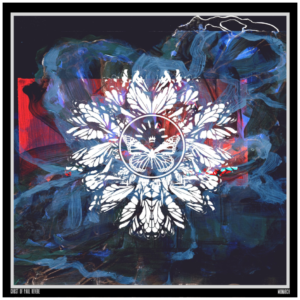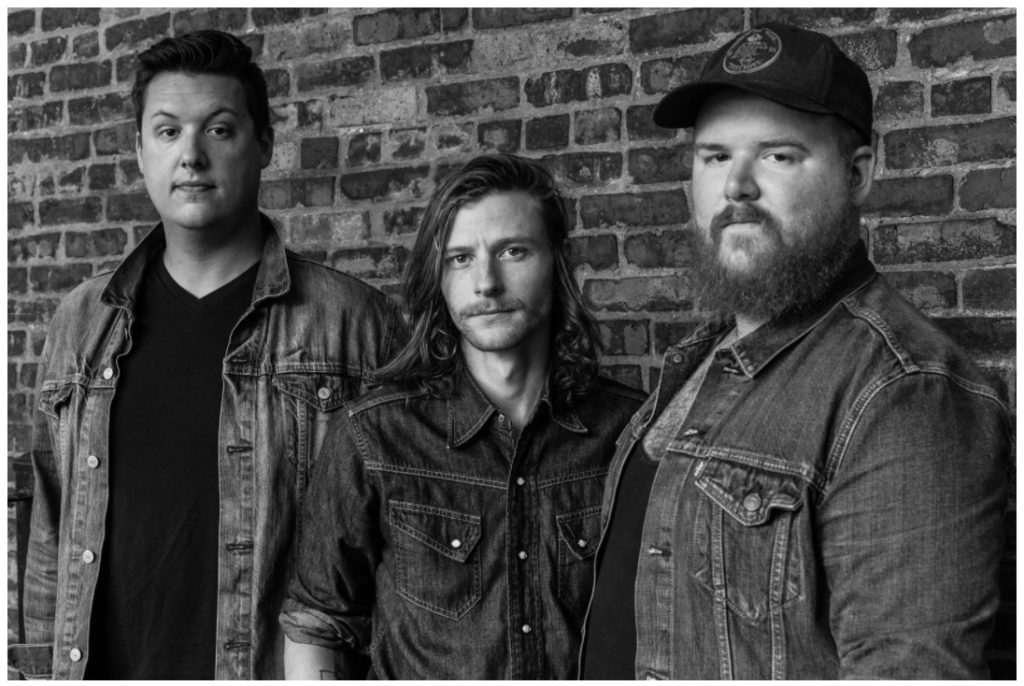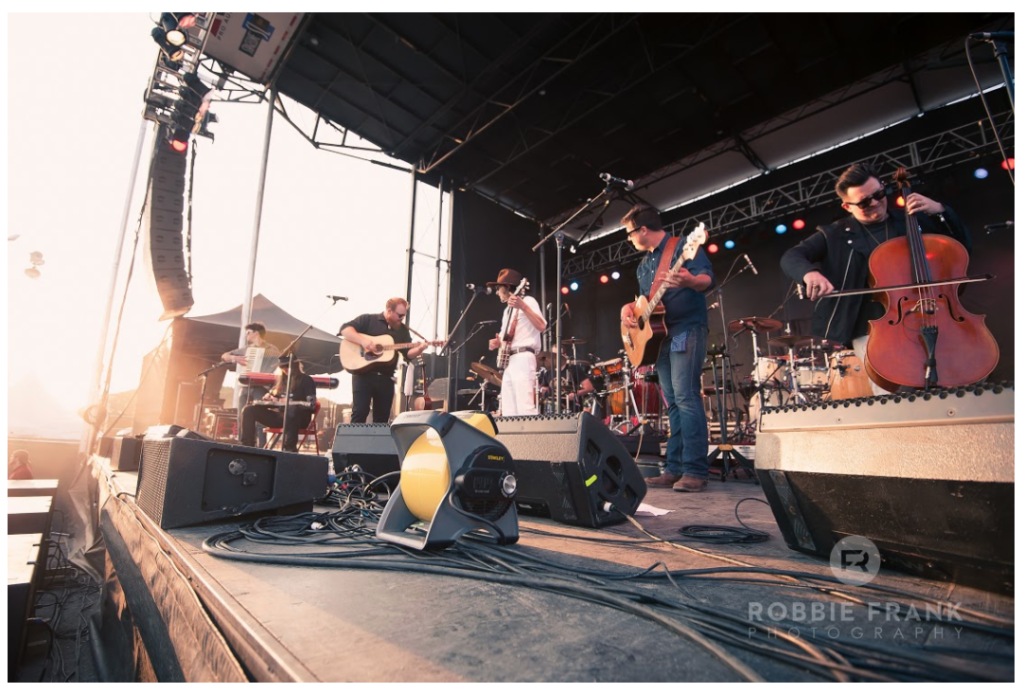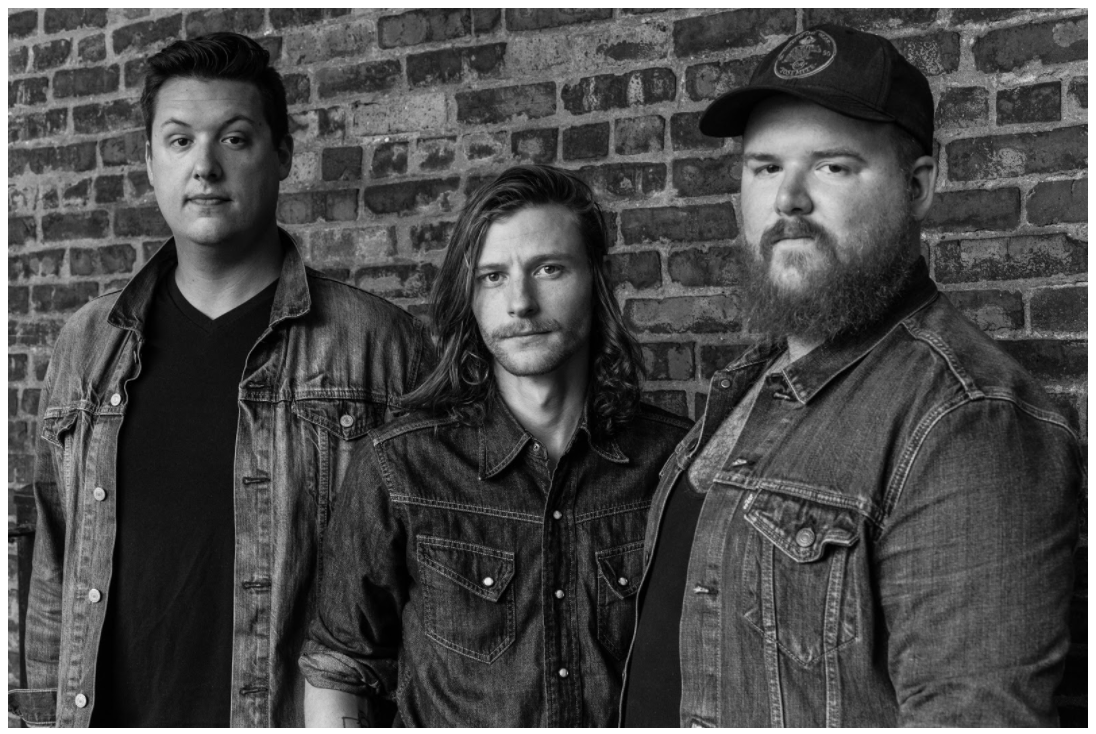Interview with Griffin Sherry (Ghost of Paul Revere): Taking Risks
The Ghost of Paul Revere is a force. Powered by stomping rhythms and skyscraping harmonies, they have become an instant sell-out in their hometown of Portland, Maine and have turned heads at Newport Folk Festival and across the country on national tours. We got the chance to chat with Griffin Sherry (guitar and vocals) after their set at the Hardly Strictly Bluegrass Festival a few weeks ago. The band has a new album, “Monarch,” out this week and it’s a gem. Billboard is streaming the album here for your listening pleasure.

RLR: Can you talk a bit about the band’s history? Looking back, how did you get your start?
GS: We started about six and half years ago in Portland. I had been performing on my own for about two years before that as “Griffin Sherry and The Ghost of Paul Revere.” That was a way to have a revolving cast of musicians and when I was performing songs I’d written, it was helpful to remove myself from the equation. It’s always been interesting to me to be able to step out of yourself to perform music. Max and Sean would occasionally join for me for harmonies, and I was encouraging Max to bring his songs too. We just decided one night that we should continue together, and I dropped my name and we became The Ghost of Paul Revere. We took first two years playing really local, playing bar gigs. Right before we released our first EP, we had our first show on a stage. Here we are, six years later, touring the country; it’s crazy.
RLR: I think a lot of people think you have to be in New York or a big city to be successful in music. You guys have made a different decision–can you talk about what some of those decision points are for you?
GS: I’ve had that conversation with quite a few people in Portland who have either decided to stay or decided they needed to move to New York City, or Los Angeles, or Nashville, because they felt like that was the only place they could find opportunity. And there are opportunities in those places, and at the same time, it can be a lot more difficult to find opportunities there.
For us, we have a home base, we love Maine, and don’t want to leave, so it didn’t make sense to go anywhere else. It just meant we needed to play more shows, and the more we played, the more people we got out. There was a pretty conscious decision in the beginning to try not to be a Portland-based band. I’ve met incredible musicians and friends in that community, but because you can get gigs every weekend, and hang out with your friends, there’s a tendency to want to just stay there and to only play for people who live in Portland. We brought a lot of people into Portland, and we would also go up and play on the islands, and play in Aroostook County and try to bring our music to more communities, which really helped give us steam and get the word out. We were never the band to hide out before the show, play the show, get back in the van and don’t talk to anybody, and that made a difference.

RLR: There are times on this album when things get really lush – adding strings in, etc. How did arranging these songs for more parts impact the way you thought about them?
GS: We had always recorded albums by walking in the studio, setting up a bunch of microphones going for it for five days. And we’d record 20 songs. It was kind of that old style, where if you didn’t like the take, you just did it again. And it might take you thirty takes, and that’s how it went. I had been really interested in looking at our music in a slightly different way, and making it more of an album form.
Some of my favorites are albums you can’t necessarily recreate; stuff like Dark Side Of The Moon, or Abbey Road. They are self-contained pieces of music, and that was an original thought going into this album: what if we made something we couldn’t play live? We were always told, “You’re so much better live,” or “People need to see you live.” So, if we were just recording ourselves live [for our previous albums] but it wasn’t translating, we thought, what if we made the album something to listen to at home, and they would come to the show for a different reason.
It gave us a lot of freedom, because we could say, we’re never going to travel with a mellotron, but let’s take a chance. I loved the process of figuring out what we could do melodically with different instruments, and what we could hide in the background, and what we could do with our own instruments to fill out sounds; there’s a bunch of parts where we run the banjo through an old twin reverb. It took away that hesitation of thinking, if we put this down forever, how are we really going to recreate it? We didn’t care about that.
But there have been a couple shows recently as an 8- or 9-piece band just for the hell of it. We did it a couple of times this summer. Last spring, we invited another five musicians on stage to try to present “Monarch” for the first time. For some of the bigger shows in Portland, all our friends were in town, so we had Brian Graham and Phil Rodriguez from the Dirty Birds on horns, and Kevin Oates on cello, and Ben Cosgrove playing piano, and Jackson Kincheloe was playing lap steel and harmonica. It gave the songs some of that later-Band feel when Levon started bringing the horns in, and it was cool to hear them that way.
RLR: That’s really interesting about making the live show different enough to draw people out.
GS: I like to make it an event. But we just had this conversation the other day: every time we play Portland, we try to do something to make it unique but we haven’t actually gone out and just played in a long time. So you run into that issue too: even though I want to cover an entire album start to finish, you think, maybe we should just do Ghost songs. You forget, because we’re playing five shows a week, that you’re hearing the songs every night but people who come to see you hear you once every six months live.
RLR: It feels like “Montreal,” is a hinge for this album- that idea of taking stock that is in that song, and you have described the album as an arc. How do you think about these songs as a whole?
GS: We started at Great North Sound Society in Parsonsfield and we had semi-delusions of grandeur, of doing it like Exile on Main Street, where you’d go into the studio and write songs together and as they developed, you’d record them. And we found out pretty quickly that’s not our forte [laughs]. So we stopped that, but we had these songs, and we were writing more, and decided to approach each song individually, and arrange and dictate sonically what we think the song demands.
And through that process, we came to realize that Max and I were writing songs under similar themes: lots of things about change and loss. Sonically, the three of us also have similar tendencies. So even though we weren’t thinking about it as a full piece until later on in the recording process, each song unintentionally tended to have callbacks to the other songs. And then we were able to sit down with the fourteen songs we had put down, talk about how to structure the album and bring it to a cohesive whole.
RLR: I know that you and Max [Davis] have a night at Blue every month with Max García Conover where you can work out some songs in progress – how has that experienced helped these songs take shape?
GS: Songs like “Montreal” and “Need Somebody,” “Welcome Home,” “Avalanche,” “King’s Road,” and “Next Year” were all songs Max and I had written individually and the first time they saw the light of day was at those songwriter circles. Max [García Conover] is one of our best musical sounding boards. He’s a dear friend; we did one crazy suicide tour together and after that we were thick as thieves. Now we always share new music and what we’re writing about.
I always prefer to perform new songs in front of an audience before I get a handle on them myself. I can see how people react to them and change them accordingly. [The songwriter shows] also required us to have newer music, and it created this fuel for just writing and shedding ideas. It allows you to have more of a foundation of the song before bringing it to the band.
RLR: I’m always interested in a band’s process for developing a song–what happens when you bring a song to Sean and Max and how has that changed over time?
GS: I think we’re more comfortable with taking chances and bringing up suggestions on other people’s song. Max and I tend to watershed our songs quite a bit before we bring them to the group. So we have a pretty clear direction of where we want to go, but once we do that, it’s stuff like big tempo changes or writing harmonies. We write harmonies pretty organically–no one has ever come to a rehearsal and said, “Here at the harmony parts for this song.” We just start singing together and see where we land and kind of move around each other. And that happens with the songs as well. They might be eighty percent done when they come to the group, and that last twenty percent is really important because it allows you to step back and see other people’s opinions.
“Welcome Home,” was originally like Trampled by Turtles speed. That’s how I heard it, and was thinking of triplets on the banjo and that speedgrass kind of style. We recorded it that way and it wasn’t sitting right, and we thought, why don’t we try slower speed, and turn it into a country song just for fun. The lyrical cadence didn’t change but how we were playing it changed drastically when it finally coalesced into something.

I remember we were in Gatlinburg, TN, in the Smoky Mountain National Park, hanging out while we were on tour and Max brought this song out – and he played the banjo part. I asked him the name of the song and he said, “Chrysalides.” And we all resoundingly said “What the hell’s that mean?” But once we started to get into Max’s brain about what the song was, we could put other meaning into the song musically. We didn’t really have a solid ending and I said I would love it if the end played on the name, with these multiple string parts that grew off each other into this big cacophonous thing. And that was a conversation on day one of working on that song in a parking lot but it wasn’t until we were in the studio that it started to come to life, working on it with Kevin Oates. And at that point, I had this tag line to build off of and introduce it earlier in the song. And once we got to that point, we could take some chances with it.
You will not be taking a chance picking up Monarch on Friday. It’s a great album and will keep you good company this fall. The Ghosts are seemingly always on tour, but some highlights in their schedule include Brighton Music Hall on December 29 and two shows at Port City Music Hall on December 30 and 31.
Photo credits: Josh Wool (black and white) and Robbie Frank (concert performance).

